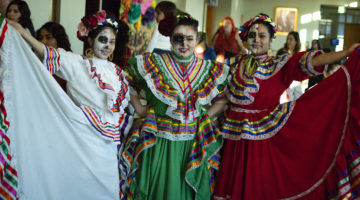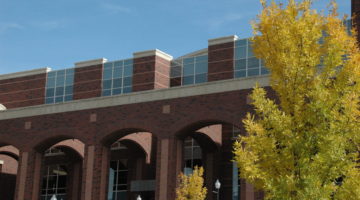
On Wednesday, Aug. 30, the former Assistant to the Director of the Latino Research Center, Iris West, distributed a four-page resignation letter outlining the issues of diversity at the University of Nevada, Reno, and encounters with particular administrative personnel. The letter included a number of direct accusations, claiming President Marc Johnson has made “tone-deaf” personnel decisions and that the administration has marginalized voices of color in favor of white women.
The Latino Research Center first opened its doors about ten years ago. Since then, the LRC has published multiple research journals, advised students and organized outreach programs in the Reno community. However, West feels that the LRC has been underfunded and underappreciated for years.
“The fact that the LRC is now hanging by a thread, without funding, staff, or support to keep programs running is a testament to little to no respect Latinos on campus receive,” West states in her letter.
Prior to West’s resignation, the LRC functioned on a staff of four people, two of which were recipients of the Fulbright Foreign Language Teaching Assistant Program. However, due to budget cuts, the Fulbright recipients were asked to leave, thus cutting the staff down to two.
West’s salary is paid half by the College of Liberal Arts and the other half by the College of Science. According to UNR’s State Appropriated Budget for 2017 to the 2018 year, the LRC receives approximately $11,000 from the state in addition to grants and community donations that are fundraised from the staff of two people. However, about $4,500 from the state is a stipend for LRC Director Dr. Emma Sepúlveda. Only $6,175 in operating funds is meant to last an entire year.
The LRC is not the only facility on campus that deals with issues in funding. The Center, Every Student, Every Story, faces a budget that prompted former director Blane Harding to leave the Center.
“What she [West] said in the letter is that these places aren’t really financially supported and they’re not,” said Harding. “They’re not given the type of funding they need for a campus that’s 39 percent diverse. There’s only limited amount of things we can do with the money that we had.”
Due to low funds, diversity-focused facilities often find themselves raising their own money to organize events promoting inclusion on campus.
“For the past five years I’ve gone out to football games and worked with Athletics to install season ticket holders seats and to go out to game day and do game day rentals,” said Jody Lykes, Student Development Coordinator for the Center. “The revenues are a partnership with Athletics and juvenile services, national organization IMGCD and I was the middle man, to raise money to do all the programming for the black culture cooperative on campus.”
While diversity among students gradually increases, the university has yet to provide more diverse coursework. Perhaps more concerning to those within the University’s diversity efforts is that the ratio of minority students to minority faculty is not equal. It’s a fact leaving some to questions the university’s priority on diversity and inclusion.
“You got a discrepancy between 39 percent diverse students and roughly 20 percent diverse faculty,” said Harding. “We don’t even teach Chicano studies. They didn’t teach African American history, it was on the books but it’s still there. Part of it was that students weren’t seeing themselves in the curriculum.”
According to a study conducted by the Center for American Progress, research finds that the disparity between minority students and minority professors can contribute to low graduation rates among many minority groups.
The CAP reports that minority students make up more than 40 percent of the national public school population, while only 17 percent of the country’s professors are minorities.
“Teachers of color serve as role models for students, giving them a clear and concrete sense of what diversity in education […] looks like,” the report’s authors write. “A recent review […] shows that students of color do better on a variety of academic outcomes if they’re taught by teachers of color.”
West expressed her disapproval of the use of cultural facilities on campus being used for good optics even while being continually
“I refuse to be used as a prop that allows the College of Liberal Arts and the current university administration to pretend they care for diversity and inclusion […] I have experienced nothing but exclusion and disrespect for many years,” West wrote.
When West refers to exclusion, she’s speaking specifically of when the College of Liberal Arts created the Hispanic Serving Institution committee. The HSI committee was formed to work toward making UNR an HSI campus. To be an HSI campus, UNR must reach a population of students that are at least 25 percent Hispanic —the university is currently at 19 percent.
Dr. Sepúlveda asked the university to allow her to lead the committee that appointed Debra Moddelmog, Dean of the College of Liberal Arts and Dr. Veronica Zepeda, Director of Graduate Student Services as co-chairs of the HSI committee.
“I have asked President [Marc] Johnson over the years to let me lead the effort, as a Director of the Latino Research Center, to make UNR an HSI,” Dr. Sepúlveda said. “He never allowed me to do that.”
Moddelmog was first asked to be the sole chair of the committee but refused to chair unless a person of Latino culture co-chaired alongside her.
“I was asked right after I got here if I would serve as chair and I said, ‘No I will not be chair, I think a Latina or Latino should be chair of that committee’ so then I became co-chair with Veronica Zepeda,” Moddelmog said. “I agreed to that role because I felt that it would be helpful to have somebody in upper administration advocating for the HSI, but I also recognized the sort of politics of a white woman being in that position so I made sure I said I won’t serve on this committee unless Emma is on the committee.”
The university’s Chief Diversity Officer, Patricia Richard, also faced criticism in West’s letter. Richard, who was brought on as Chief Diversity Officer last year, is also President Johnson’s Chief of Staff.
Richard’s qualifications to be Chief Diversity Officer have been criticised due to her lack of experience in diversity work. Richard holds a bachelors degree in music and a masters degree in communication.
In her resignation letter, West said Richard’s appointment to the position shows the university’s lack of dedication to diversity. Others share a similar view.
“She has no knowledge of the issues that she is going to fight for us,” Dr. Sepúlveda said. “That is just offensive to me personally as a woman of color on this campus that […] a white woman with a masters […] in a subject that doesn’t have anything to do with diversity.”
The Nevada Sagebrush reached out to Richard for comment but received no response.
WHAT’S NEXT?
Since West’s resignation, the future of the LRC remains unclear.
Darrell Lockhart, Associate Dean of the College of Liberal Arts, was appointed as acting director of the LRC while Dr. Sepúlveda is on sick leave. However, due to West’s resignation, Moddelmog claims that the original plans for acting director are in the process of being restructured.
West mentions Lockhart in her resignation letter and described previously working with him as “difficult”.
“As my direct supervisor in the past, he was never supportive or demonstrated any interest or respect for my opinions and ideas,” West wrote in her letter. “In fact, I was forced to work two jobs taking care of the needs of his department and the LRC at the same time for the same three digit paycheck.”
Lockhart responded to these claims made by West by indicating that he could not comment on any kind of personal matter with an employee.
Although it is uncertain how long the LRC will remain closed, the College of Liberal Arts will be searching for new faculty to occupy positions in diversity-focused areas to be created this upcoming year.
“In collaboration with faculty in other departments across campus, we are developing a variety of interdisciplinary majors and minors focused in different areas of gender, race, and identity, which we hope will be available to all UNR students in the next year or two,” Moddelmog said.
The university has received backlash since a student was identified as a participant at a white supremacist rally in Charlottesville that turned violent. The Associated Students of the Universtiy of Nevada president, Noah Teixeira, said the attention has forced the university to focus on how they handle diversity.
“It shined a light on something that has been going on for a while,” said Teixeira. “I know the university is going to give more. It takes a while to get these things done.”
In her resignation letter, West questioned why a white supremacist would feel comfortable going to school at UNR and said the university’s efforts toward diversity were a “marketing strategy.”
President Johnson has not provided a statement regarding West’s resignation letter and did not respond to The Nevada Sagebrush’s request for comment.
“I think it’s time for the leadership of this university to change, I really do. I think that’s what the power of student should be forwarded to that effort,” Dr. Sepúlveda said. “We need to really start pressing for the rights we fully deserve. The students are the ones that have to make the decisions. You don’t work for President Johnson, President Johnson works for you and for the rest of the state of Nevada.”
Teixeira agrees that students have the power to bring about change at the university.
“We as students need to change the culture on campus,” said Teixeira.
Karolina Rivas can be reached at mpurdue@sagebrush.unr.edu and on Twitter @karolinarrivas.












